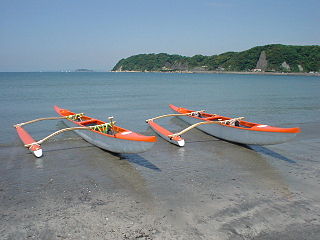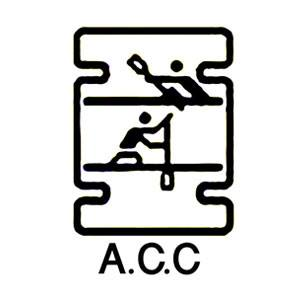
Outrigger boats are various watercraft featuring one or more lateral support floats known as outriggers, which are fastened to one or both sides of the main hull. They can range from small dugout canoes to large plank-built vessels. Outrigger boats can also vary in their configuration, from the ancestral double-hull configuration (catamarans), to single-outrigger vessels prevalent in the Pacific Islands and Madagascar, to the double-outrigger vessels (trimarans) prevalent in Island Southeast Asia. They are traditionally fitted with Austronesian sails, like the crab claw sails and tanja sails, but in modern times are often fitted with petrol engines.

The International Canoe Federation (ICF) is the umbrella organization of all national canoe organizations worldwide. It is headquartered in Lausanne, Switzerland, and administers all aspects of canoe sport worldwide. 157 countries are affiliated with the ICF after seven national federations were added at the 2008 ICF Congress in Rome.
Canoe sailing refers to the practice of fitting an Austronesian outrigger or Western canoe with sails.
Canoe and kayak were held at the 2006 Asian Games in Doha, Qatar from December 10 to December 14. Men's and women's competitions were held in kayak and men's competition in canoe with all events having taken place at the West Bay Lagoon. The competition included only sprint events.
Canoeing events have been contested at every Asian Games since 1990 Asian Games in Beijing.
Canoeing and Kayaking were held at the 2002 Asian Games in Busan, South Korea from October 10 to October 12. Men's and women's competition were held in Kayak and men's competition in Canoe with all events having taken place at the Nakdong River Rowing and Canoeing Courses. The competition included only sprint events.
Canoeing at the 2010 Asian Games was held in Guangzhou, China from November 13 to 26, 2010. Men's and women's competition were held in Kayak and men's competition in Canoe with all events having taken place at the International Rowing Centre.

The Pakistan Canoe and Kayak Federation (PCKF) is the official national governing body for canoeing and kayaking Olympic sports in Pakistan. Its function is to promote sporting activities and events for canoe and kayak paddlers across the country on a national and international level. PCKF is a non-profit organisation, which represents all people and organisations with a genuine interest in canoeing, kayaking and associated sports, helping them to increase the profile of these sports across Pakistan.
The 2010 Canoe Slalom World Cup was a series of five races in 5 canoeing and kayaking categories organized by the International Canoe Federation (ICF). It was the 23rd edition and it marked the first time that women competed for the single canoe world cup points and title. The series consisted of 2 continental championships which were open to all countries and 3 world cup races. The athletes gained points for their results in the three world cup races plus their best result from any of the two continental championships.
The Asian Canoeing Championship is a Canoeing championship organised by the Asian Canoe Confederation for competitors from Asian countries.
The 2005 Canoe Slalom World Cup was a series of eight races in 4 canoeing and kayaking categories organized by the International Canoe Federation (ICF). It was the 18th edition. The series consisted of 4 continental championships, 3 world cup races and the world championships.

Canoeing at the 2020 Summer Olympics in Tokyo was contested in two main disciplines: canoe slalom, to take place from 25 to 30 July 2021, and canoe sprint, from 2 to 7 August. The slalom competitions will be held at the Kasai Canoe Slalom Course; whereas the sprint events will be staged at Sea Forest Waterway.
Canoeing at the 2014 Asian Games was held in Hanam Misari Canoe/Kayak Center, Hanam, South Korea from September 27 to October 2, 2014. There were sprints and a slalom on flat water and not an artificial canoe slalom course.

Camakau are a traditional watercraft of Fiji. Part of the broader Austronesian tradition, they are similar to catamarans, outrigger canoes, or smaller versions of the drua, but are larger than a takia. These vessels were built primarily for the purposes of travelling between islands and for trade. These canoes are single hulled, with an outrigger and a cama, a float, with both ends of the hull being symmetrical. They were very large, capable of travelling open ocean, and have been recorded as being up to 70 ft in length.
Canoeing at the 2015 Southeast Asian Games was held at the Marina Channel, Singapore from 6 to 9 June 2015.

The Asian Canoe Confederation (ACC) is the continental governing body of the sport of canoeing in Asia.
The canoeing races at the 2018 Asian Games in Jakarta and Palembang were contested in three main disciplines: the slalom from 21 to 23 August, and the sprint from 29 August to 1 September. The slalom canoe competition was held at the Bendung Rentang in Majalengka Regency, West Java; whereas the sprint events were staged in Jakabaring Lake at the Jakabaring Sport City, Palembang. Additionally, the games also contested the canoe polo discipline as demonstration sport. Also in part of canoeing event was the dragon boat event.

Bangka are various native watercraft of the Philippines. It originally referred to small double-outrigger dugout canoes used in rivers and shallow coastal waters, but since the 18th century, it has expanded to include larger lashed-lug ships, with or without outriggers. Though the term used is the same throughout the Philippines, "bangka" can refer to a very diverse range of boats specific to different regions. Bangka was also spelled as banca, panca, or panga in Spanish. It is also known archaically as sakayan.
Dragon boat at the 2018 Asian Games was held in Palembang, Indonesia from 25 to 27 August 2018 as a part of the canoeing competition. All events were held at Jakabaring Lake.

Polynesian multihull terminology, such as "ama", "aka" and "vaka" are multihull terms that have been widely adopted beyond the South Pacific where these terms originated. This Polynesian terminology is in common use in the Americas and the Pacific but is almost unknown in Europe, where the Anglo-Saxon terms "hull" and "outrigger" form normal parlance. Outriggers, catamarans, and outrigger boats are a common heritage of all Austronesian peoples and predate the Micronesian and Polynesian expansion into the Pacific. They are also the dominant forms of traditional ships in Island Southeast Asian and Malagasy Austronesian cultures, where local terms are used.









